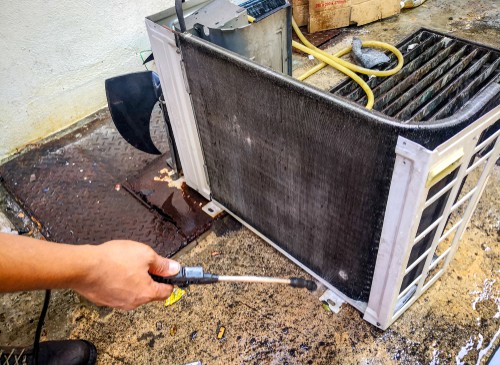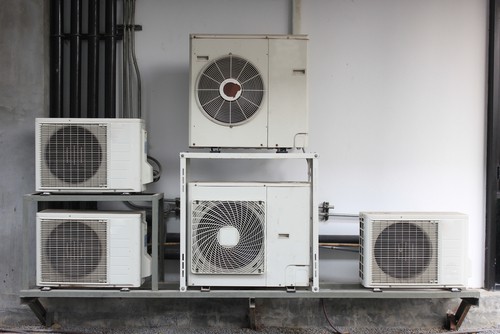The air conditioner condenser is a square or round box located outdoor. It receives high-pressure and high-temperature refrigerant from the compressor and rejects the heat in it into the air. As a result, the refrigerant turns back into a liquid state. The air conditioner unit includes a fan or the panel and the external unit will consist of the compressor.
The fan and the compressor generally make a certain degree of noise, and therefore an air-conditioner will come in a proofed material. During the installation, the technician will ensure that he has properly mounted all the fasteners and any fencing used to absorb all the vibration the unit produces. But with time, the systems start to fail. You can easily diagnose all the noise the air conditioner produces and easily fix them to provide a long-lasting result. Some of the noise in the aircon condenser may result from;
1. Foreign objects
If your air conditioner starts making noise suddenly consider checking whether there is a foreign object, which might have fallen into the unit. Mostly this will happen on the window air conditioners. Since the outer part of the unit hangs outside the window, small animals or flying debris can enter into the air conditioner. When this happens, consider switching off the air conditioner immediately and opening the front and using a torch to check inside. If your office or room happens to be on the ground floor, it will be most likely that a group of rats or lizards may have gotten into the system and made it their home. You will have to remove all the foreign objects inside it, fasten the front grille and then start the procedure once more.
2. The fan blades
The fan blades in the air conditioner condenser may bend due to hitting foreign objects within the unit. Ensure that you check the fan blades from time to time to ensure they are straight. If not, consider straightening and aligning them properly. In addition, if any of fan blades happen to break, it can rub the fan housing and therefore create noise. You may also consult a professional to ensure that the fan blades are in the proper state.

3. Vibration
Window Air conditioners are heavy units with many moving parts and also mounted on windows. If the installer happens not to mount them correctly, they will be prone to more vibrations. To check for excess vibration on the unit, you will have to touch the window on which the unit is mounted and if it happens that the vibration on the unit is high consider calling the person who did the installation to fix the problem.
4. The front grille
You will need to remove the grille more often when cleaning the filter. Typically a simple locking mechanism holds the grille in place. If after cleaning you fail to return the grille in the proper way or even the locking mechanism happens to be defective, the unit will vibrate and cause unexpected noise. To eliminate the noise, you will have to remove the grille and set it back in place properly. If the locking mechanism turns out to be defective, you will have to remove it and replace with a new one.
5. Insufficient lubrication
If you have not adequately lubricated the fan motor, it will result make high noise. If you realize that the lubrication is insufficient, you will have to begin by switching off the system to avoid damaging the motor. Since most of fan motors in fan units are always sealed, you will need a technician from a servicing company to do the lubrication. Sometimes the blower motor bearings may wear out and in such cases, you will have to replace the motor.
6. The compressor
Generally, the compressor will be noisy. If it is louder than it used to be when it was new, it might be worn or completely worn out. It will not be dangerous to run the unit with noise from the compressor. In fact many units will last for several years with worn-out compressors.
How much noise should the air conditioner make?
Noise generated by the air conditioner is a sensitive topic and you also need to consider it before you install any air conditioner unit. An exterior air conditioner unit must have a label stating the maximum noise it can produce. Noise in the air conditioning units reduces with distance and you can also prevent its spread with a fence or a barrier.

What determines the amount of noise?
The different types of aircon will provide various problems when it comes to quieting but all of them will have one thing in common. Old units will create more noise compared to newer units as they’re nearing the end of the working cycle. But mostly newer units are quiet.
Window units are hard to quiet and mostly the noise will not originate from the unit. You will witness noise when the unit is off as air will flow through it, causing some sound. If you happen to remove the filter and front vent panel, you will see outside, and therefore air has an unconstrained way into the interior. You can quickly solve the problem. To solve it you can fit a shield on the outside part of the unit, therefore, causing the airflow and the sound to take the right angle into the path landing into unit’s the air intake in the aircon. Incorporating the shield with the right sound-absorbing closed-cell foam will reduce the noise. Attendants in the sheet metal shop will make you the sheet provided you present them with the right dimensions.
The pad-mounted-out units will make more noise compared to all other units, even when new. Their work is to cool and heat a large area; therefore, the producer will make them in large sizes. Trying to reduce the noise with some soundproof materials may not work, and you should consider setting up a barrier or a fence. If the system is roof-mounted, ensure enough soundproof pads beneath them to reduce the vibrations which the system may transmit into the ceiling.
For the attic systems, its better to hang them from vibration mounts rather than setting them on the pads to reduce the amount of noise they produce. If the system has belts to run the system fans, problems may arise due to the aging and wearing of the various assemblies and the bearing blocks. Quiet units may continuously become noisier due to aging as loose parts will begin to produce sound.
